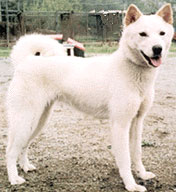In a nutshell, microevolution is anything that can be done to a dog through selective breeding, without cloning.
From a creationist's perspective, the animal was created in its ideal form. Changes necessarily happen over time, in the same way that your brand new car will not stay brand new.
Speaking from a biological perspective, there's a huge difference between tweaking or removing a gene, versus changing the karyotype and jumping from one species to another. There are definite species barriers. Evolutionism assumes that if small changes are possible, then large changes can happen as an accumulation of small changes. This ignores the reality of the situation. The genome behaves like a glass of water: you can slosh it around, and even lose some of it, but it remains contained, or else it ceases to exist.
The second biggest false assumption of evolutionism is that if random change is possible, then good random change is also possible, and with natural selection things can get better. There would be a significant difference between talking about things getting better by chance, which is already not the way things generally work, to talking about things becoming more meaningful by chance, which would be utterly impossible. It's the difference between liking the patina of your car after it has thoroughly rusted, versus the onboard computer having a glitch and spontaneously programming a new fuel efficiency monitor into itself. Getting "better" is subjective and potentially incremental, while getting "more meaningful" requires intent and has to be done in large
irreducible steps. The genetic code has meaning. It's not like a new coat of paint, but much more like written text.
So, what can happen in microevolution?
- Things can always get worse.
- Lateral movement is possible (evolution of blue eyes from brown, or the evolution of blonde hair from brown), but even in this case the movement is not genuinely lateral. While blonde hair may be functionally similar in value to brown hair, genetic sense is being lost. Hence, the evolution is negative.
- Genes can be lost.
- Bad genes can be formed, usually from formerly good ones.
- Genes that have gone bad in small ways, such as through a base pair substitution, can revert spontaneously, but usually only in populations that reproduce in high numbers. New genetic information is not created in the process. It would be more like a transcriber accidentally correcting a typo through another typo, rather than a transcriber accidentally writing a new book.
- Genetic expression can change the degree of attributes without changing the amount of sense in the genetic code. For example, an animal may become more muscular through the increased expression of anabolic hormones, but while this makes for a stronger animal, it does not involve new information. It's a change of degree, not type. One might also argue that there are costs to the increased strength, but it can go both ways.
- Natural selection promotes stasis, not evolution. The animal that changes, dies:
Wild rabbit
Wild Rabbit
Wild Rabbit
Domestic dog
Domestic dog
Domestic dog
Hence, any real change requires the removal of natural selection. Even then, the domestic dog cannot be bread into a bird or some other species. Under the most fluid of conditions, the change appears to have very definite limits.
This is microevolution.
Macroevolution is the assumption that microevolution, taken repeatedly, results in much larger changes. Macroevolution assumes that if the transcriber can accidentally misspell a word, then he can "accidentally," without knowledge or aforethought, write an epic novel. Macroevolution assumes that if a dimple in the fender can accidentally pop back out, to the fender's former shape, then the fender can accidentally crinkle into the shape of a functional wing. It assumes that if we keep crashing our cars into things, then we'll eventually, just by pure luck, wind up with something better than the new car, and all we have to do is refuse to buy the inferior model. Macroevolution pretends that there are no genetic limits to a species, that a thing can fluidly change from one type of animal to another. Macroevolution equates "better," with
more meaningful. Macroevolution assumes that a thing can have meaning without an intelligent mind to give it meaning.






